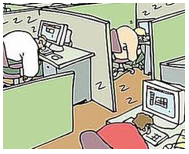How Do Lawyers Measure Productivity?
Posted By Cliff Tuttle | May 28, 2012
No. 840
 The Pittsburgh Post-Gazette reprinted an article from the Legal Intelligencer about attorneys fees. It seems that Pennsylvania law firms that participated in a certain survey increased their fees this past quarter by about 9%, which exceeds the national average of 3% by about triple. There was some speculation that the Pennsylvania firms were “catching up”. No actual dollars were mentioned, of course. But the article went on to say that despite fee increases, the law firms didn’t increase revenues. Poor law firms!
The Pittsburgh Post-Gazette reprinted an article from the Legal Intelligencer about attorneys fees. It seems that Pennsylvania law firms that participated in a certain survey increased their fees this past quarter by about 9%, which exceeds the national average of 3% by about triple. There was some speculation that the Pennsylvania firms were “catching up”. No actual dollars were mentioned, of course. But the article went on to say that despite fee increases, the law firms didn’t increase revenues. Poor law firms!
Toward the end of the article appeared a topic that caught my eye — lawyer productivity — defined in terms of the number of billing hours worked per lawyer.
Productivity, real productivity, is measured by the efficiency of production. Increased productivity in a competitive market will lead to lower costs to the consumer, not higher ones. Technology is a major factor in increasing productivity and reducing costs. So is transferring tasks to lower paid workers, like using paralegals rather than lawyers to do repetitive and well-defined tasks. But is the phenomenon described here, getting more billing time per lawyer, true productivity?
In a perverse way, yes. From the law firms point of view, when they get in an extra dollar and didn’t have to increase payroll costs to do it, the return on investment increased one dollar. But does that dollar represent a true productivity increase?
Is daily hour twelve billed by an overworked lawyer equivalent to daily hour five? Did it produce an equally creative and effective work product as the hours expended when the lawyer was fresh and rested? There is no empirical way to answer these questions, but we all know the answer. If you need to be persuaded, read “Manage Your Energy, Not Your Time”, the post appearing immediately below.
If you must measure in hours, then a task completed in fewer hours — not more — represents increased productivity. While you cannot measure lawyer productivity objectively, that doesn’t mean you know nothing. Lawyers and clients know a good job and good results when they see it and, over time, they know whether cases are being billed fairly.
Hourly fees by their nature discourage productivity, and flat fees or capped fees encourage it. The lawyer, not the client, takes the risk that unanticipated extra effort may be required to cross the finish line first. What’s wrong with that?
One last thought: a good settlement is, in many cases, better than victory. This is especially true when settlement involves voluntary payment while victory requires more lawyering to collect. If more lawyers worked for flat fees, they might just be inclined to do themselves and their clients a favor and settle more cases. What a concept!
CLT



